Press releases
Facsimile manuscript pages from third-century New Testament book on display in Minsk
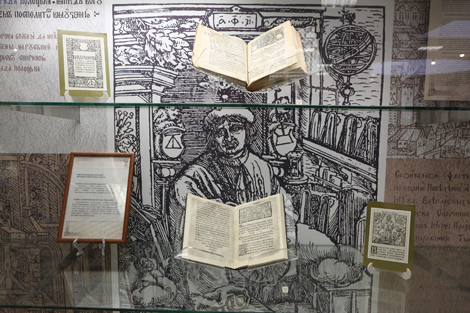 MINSK, 10 March (BelTA) – A unique facsimile copy of a fragment from one of the oldest books of the New Testament, the First Epistle of Peter dating back to the third century, has been put on display as part of the Book of Books exhibition at the National Library of Belarus for the first time, BelTA has learned.
MINSK, 10 March (BelTA) – A unique facsimile copy of a fragment from one of the oldest books of the New Testament, the First Epistle of Peter dating back to the third century, has been put on display as part of the Book of Books exhibition at the National Library of Belarus for the first time, BelTA has learned.
The exhibition is timed to celebrate the 500th anniversary of The Bible by Francysk Skaryna and the Day of Orthodox Christian Book. Director of Belarus’ National Library Roman Motulsky opened the exhibition and said that the book fragment is currently on display in Minsk thanks to the cooperation with the Vatican Library. The exhibition also features other items telling the visitors about the thousand years of history of the Bible on the territory of Belarus, from the 11th-century Turov Gospel and the 12th-13th century Polotsk Gospel to modern editions.
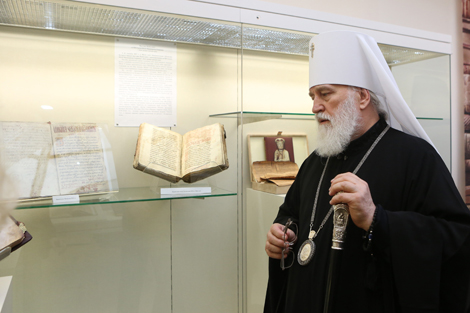 The exhibits dating back to the 15th-20th centuries from the holdings of the National Library tell about old manuscript scriptural texts, translations and editions of the Bible in Belarus, Russia, Ukraine and Western Europe. The exhibition features original manuscript and print books in different languages illustrated by famous artists of different centuries. For instance, it showcases a copy of one of the first print Bibles in Western Europe dated 1475, one of the earliest Bible translations into German (1523), the first accurate print translation into Polish (1561), and the first full translation into a Slavic language (1581). The exhibits on display also include biblical texts printed in Belarus, Russia and Ukraine in the 17th-18th centuries, the best illustrated Bibles of the 17th-20th centuries, and the first attempts to translate the Bible into the Russian and Belarusian languages.
The exhibits dating back to the 15th-20th centuries from the holdings of the National Library tell about old manuscript scriptural texts, translations and editions of the Bible in Belarus, Russia, Ukraine and Western Europe. The exhibition features original manuscript and print books in different languages illustrated by famous artists of different centuries. For instance, it showcases a copy of one of the first print Bibles in Western Europe dated 1475, one of the earliest Bible translations into German (1523), the first accurate print translation into Polish (1561), and the first full translation into a Slavic language (1581). The exhibits on display also include biblical texts printed in Belarus, Russia and Ukraine in the 17th-18th centuries, the best illustrated Bibles of the 17th-20th centuries, and the first attempts to translate the Bible into the Russian and Belarusian languages.
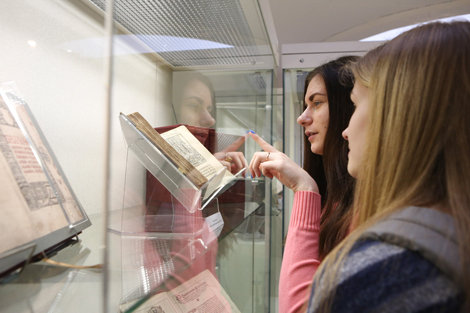 The opening ceremony was attended by Metropolitan Pavel of Minsk and Zaslavl. “Despite the fact that technology is increasingly penetrating our lives, books retain their positions. When we read, there is something bigger happening. We open a book and start to perceive the world differently. Books do not just educate people, they also contribute to the development of creativity and imagination. Books will always be books because they make people better. They encourage us to work, think creatively,” Metropolitan Pavel of Minsk and Zaslavl noted.
The opening ceremony was attended by Metropolitan Pavel of Minsk and Zaslavl. “Despite the fact that technology is increasingly penetrating our lives, books retain their positions. When we read, there is something bigger happening. We open a book and start to perceive the world differently. Books do not just educate people, they also contribute to the development of creativity and imagination. Books will always be books because they make people better. They encourage us to work, think creatively,” Metropolitan Pavel of Minsk and Zaslavl noted.
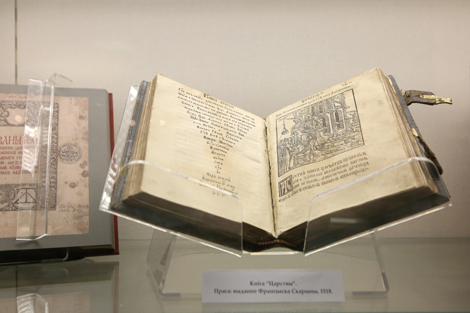
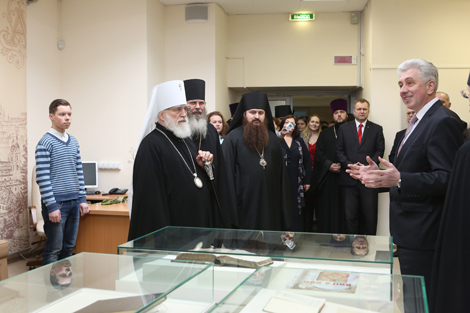







 print version
print version make home page
make home page add to bookmarks
add to bookmarks

